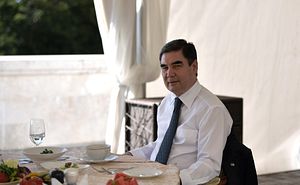State-sponsored media in Turkmenistan has been working diligently to refute rumors that President Gurbanguly Berdimuhamedov is dead or incapacitated. The country remains orderly with life proceeding as usual, but the fact that such Ruritanian confusion is still possible indicates how dysfunctional the government is and is likely to remain.
Starting on July 21, local rumors that President Berdimuhamedov had died seeped into web-based news stories. Berdimuhamedov, 62, is known to suffer from diabetes and initial reports claimed that he had suffered renal failure. Since the stories first broke, however, the individual who made the original claim, Director of Eurasian Problems Monitoring Center Aslan Rubaev, retracted his statement and apologized to the Berdimuhamedov family. Nevertheless, speculation continues to abound as locals and observers wait for a public appearance.
Turkmenistan’s government-sponsored news sources do not deny the rumors outright but have endeavored to strongly suggest that the leader is still alive. The official message is that he was on vacation and busy writing a book. As proof of life, government-sponsored new agencies reported that Berdimuhamedov had telephoned Uzbekistan’s President Shavkat Mirziyoyev to congratulate him on the occasion of his July 24 birthday. The following day Turkmenistan’s president sent a written message to Boris Johnson as he became Britain’s prime minister. Such reports remain unconvincing because Berdimuhamedov typically appears in public daily and while these events imply activity, they are not conclusive proof of life.
The official news channel Watan went to great lengths to demonstrate that Berdimuhamedov is alive and well — and in charge. Nearly half-an-hour of the evening’s news on August 5 was devoted to demonstrating what the president did during his vacation: firing guns, riding horses, working out at the gym and bowling. Moreover, the news showed him autographing and dating his most recent intellectual undertaking. Still these were not live public appearances and have not completely extinguished the idea that he might be indisposed.
Speculation abounds, not least of all because leaders and officials from the Caspian region countries, including Prime Minister Dmitry Medvedev from Russia, are scheduled to arrive for a high-level meeting on Turkmenistan’s Caspian shore. The Caspian Economic Forum will take place in Turkmenistan’s resort city Awaza from August 11 to 12. The meeting is unlikely to affect daily life in the country as the citizens of Turkmenistan will be busy celebrating Gurban Bayram (Eid al-Adha or Festival of the Sacrifice) which occurs August 10-14 this year to mark the final month of the Islamic calendar. It is a time for interaction with families, friends, and neighbors, as well as the hajj to Mecca for a lucky few, but not politics.
So how are Turkmen reacting to rumors that their leader has died? Social media has exploded with commentaries. Turkmen are actively speculating on Instagram, Twitter, Youtube, and IMO about the president’s condition. Some Turkmen-language social media have suggested that the leader is dead or incapacitated, while other posts, including by well-known Turkmen singers and performers, slam these “traitors” for suggesting that anything could be amiss in the motherland.
This uproar of opinions is noteworthy because such observations could be dangerous in Turkmenistan’s closed society, where the government blocks international and opposition websites and closely monitors email activity. It is also interesting to note that while Turkmen are typically silent on issues of government and politics, these sites and tweets have seen thousands of viewers. The government has not shut down the internet during this episode. This may indicate that the state does not want to alarm people further.
If the president dies there are procedures in place to facilitate succession. The Speaker of the Parliament, Ms. Gulshat Mammedowa, is in line to take over the presidency. The question is, will she? Will the Turkmen allow a woman to lead the country? Will palace intrigue lead to her being pushed aside? If she doesn’t take the reins, who will?
For several years now, it has appeared that Berdimuhamedov was grooming his only son, Serdar, to succeed him. The president recently promoted his 37-year-old son to the position of governor of the important and centrally located Ahal province. Serdar is also a member of the Majlis (parliament) and holds the rank of Lieutenant Colonel. He studied in Ashgabat, where he earned a PhD in Engineering; in Moscow, at Russia’s Diplomatic Academy; and finally, at the Geneva Centre for Security Policy in Switzerland.
Observers often see Serdar as the presumptive heir because the press regularly reports on him, despite there being 124 other members of parliament. For example, in 2018, when the president and parliamentarians attended the opening of a new airport in the easternmost Lebap province, the press focused on Serdar. As part of the celebration, father and son ran a race during which Berdimuhamedov passed a baton to Serdar. Many perceived this as a symbolic gesture. The state-sponsored news (Türkmen Döwlet Habarlar or TDH) printed a story suggesting that when the Turkmen leader handed over a baton to Serdar “this became a symbol of the continuity of generations.”
When Turkmenistan’s first president, Saparmurat Niyazow, died in December 2006, the same constitutional procedures were in place as there are now, but the government did not follow them. The speaker of the Majlis, Owezgeldi Atayew, should have become the interim president. But instead Berdimuhamedov, who at the time was the minister of health and a deputy prime minister, took control. After a parliamentary vote dismissing him from office, Atayew was arrested and sentenced to five years in prison. This recent history suggests that while the transfer of power in Ashgabat will likely be peaceful, it is not necessarily going to go by the book.
Dr. Victoria Clement is the Eurasia Regional Analyst at the Center for Advanced Operational Culture Learning (CAOCL) at Marine Corps University in Quantico, VA.
This work does not represent the view of CAOCL or the Marine Corps.































